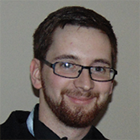Codeplay attended HiPEAC 2014
06 March 2014
Over 500 participants from industry and academia came together in Vienna for the HiPEAC 2014 conference in January, and members of Codeplay’s R&D team were there.
There was a wide range of interesting talks, tutorials and workshops covering all areas of embedded and high performance computing.
Overall, much of the conference tended towards performance portability and power consumption for embedded SoC hardware, and the progress and development of future programming models and compiler optimisations.
There was a large amount of interest in future embedded architectures with shared memory models for CPUs, GPUs and other processors, and also in new technologies that will allow improved programming models such as OpenCL™ 2.0?s shared virtual memory (SVM) and the HSA Foundation’s low-level architecture language, HSAIL.
The Khronos Group was also present at the conference, and launched the recently ratified SPIR 1.2 (Standard Portable Intermediate Representation) specification, as well as promoting its OpenCL workshop conference, IWOCL, which takes place at the University of Bristol in May.
Codeplay is the technical coordinator for the EU FP7 project: LPGPU. The LPGPU workshop on Power-Efficient GPU and Many-core Computing (PEGPUM) was hosted by the LPGPU consortium at HiPEAC for the second year. The workshop ran for a full day with a collection of interesting talks. Ralph Potter, a research postgraduate working with Codeplay, presented his talk “Fusing GPU kernels with a novel single-source C++ API”, proposing a C++ solution for fusing multiple OpenCL kernels together.
The FAT-GPU (Formal Analysis Techniques for GPU Kernels) tutorial presented research from the EU FP7 CARP project, of which Codeplay are a member. This tutorial described the GPUVerify tool that was developed by Alastair Donaldson’s team at Imperial College London, that aims to help verify that GPU kernels are free of data races and barrier divergences
HiPEAC also featured a talk from the European Commission’s Max Lemke, presenting further details of the Horizon 2020 program for innovative research; and organized a consortium meeting to discuss future projects.
OpenCL and the OpenCL logo are trademarks of Apple Inc. used by permission by Khronos.
